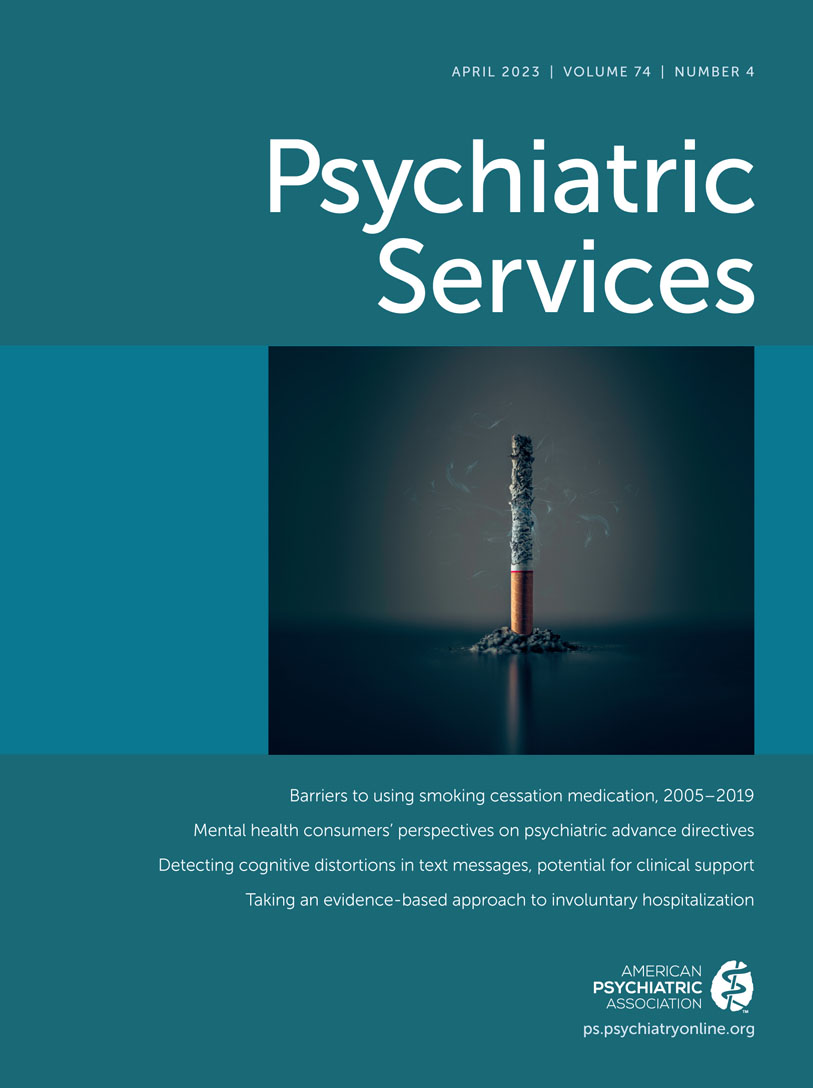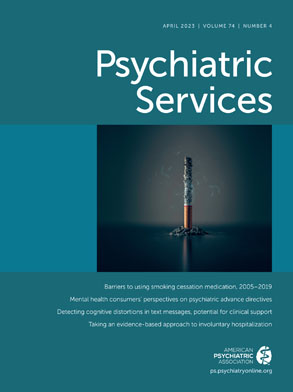Mental Health Service Users’ Perspectives on Psychiatric Advance Directives: A Systematic Review
Abstract
Objective:
Methods:
Results:
Conclusions:
HIGHLIGHTS
Methods
Search Strategy
Eligibility Criteria
Study Selection
Data Extraction and Quality Assessment
Data Synthesis
Results
Study Characteristics
General Preferences
| Domain or subdomain | N of studies | Qualitative studies | Quantitative studies |
|---|---|---|---|
| Interest in PADs | 23 | ||
| PADs were endorsed by >60% of users | 18 | 15, 35, 36, 48, 58 | 8, 20, 23, 27, 29, 30, 38, 45, 47, 51, 53, 59, 60 |
| Mixed endorsement (40%–60% of users were interested in PADs) | 4 | 64 | 24, 43, 55 |
| PADs were endorsed by <40% of users | 1 | 52 | |
| Satisfaction with PADs | 10 | ||
| Satisfied (>60% of users were satisfied) | 8 | 15, 62 | 17, 18, 37, 40, 43, 56 |
| Mixed responses (40%–60% of users were satisfied) | 1 | 38 | |
| Not satisfied (<40% of users were satisfied) | 1 | 41 | |
| Preferred PAD facilitatorsb | 17 | ||
| Treatment team | 14 | 35, 40, 46, 48, 49, 58 | 17, 21, 23, 27, 29, 38, 43, 59 |
| Family or friends | 6 | 35, 46, 49 | 17, 38, 59 |
| Peer support workers | 3 | 46 | 17, 20 |
| Other (e.g., external facilitator, lawyer) | 4 | 33–35 | 38 |
| Legal force of PAD | 9 | ||
| Preference for legally binding PAD | 8 | 31, 44, 59 | 16, 23, 27, 45, 47, 59 |
| Inconsistent attitudes of service users toward legal force | 1 | 38 | |
| Revocability of PAD | 10 | ||
| Preference for PADs that cannot be revoked when users lack competence to consent | 7 | 36, 44, 61 | 25, 27, 29, 38 |
| Ambivalent attitudes of service users toward revocability | 2 | 23, 59 | |
| Preference for PADs that can be revoked when users lack competence to consent | 1 | 63 | |
| Criteria for PAD applicationb | 5 | ||
| Clinicians’ or relatives’ judgment should be followed | 3 | 23, 58 | 59 |
| Crisis services utilization or hospitalization | 2 | 16, 25 | |
| Specific symptoms | 1 | 58 | |
| Lack of competence to consent | 1 | 25 | |
| PAD storageb | 6 | ||
| With treatment team members | 4 | 32, 42 | 38, 43 |
| With family or friends | 2 | 32 | 38 |
| Electronic | 3 | 42, 46 | 15 |
| Preference for regular evaluation or update | 2 | 46 | 59 |
Benefits
| Domain or subdomain | N of studies | Qualitative studies | Quantitative studies |
|---|---|---|---|
| Personal benefitsb | 34 | ||
| Increased sense of autonomy, control, or empowerment | 31 | 14, 15, 19, 20, 23, 24, 33, 36, 42, 46, 48–50, 52, 54, 56, 58, 59, 61, 62, 64 | 16–18, 20, 23, 27, 29, 37, 38, 43, 45, 47, 59, 62 |
| Increased sense of safety and “peace of mind” | 7 | 19, 44, 54, 56, 59, 61, 62 | |
| Protection of service users’ rights | 5 | 15, 19, 46, 59 | 45 |
| Promotion of recovery and well-being | 10 | 40, 46, 52, 59 | 23, 27, 29, 37, 38, 55, 59 |
| Increased understanding of one’s illness | 4 | 40, 44, 49, 56 | |
| Reflection on experiences from past crises | 2 | 14, 46 | |
| Treatment-related benefitsb | 23 | ||
| Improvement of communication and provision of information | 10 | 14, 23, 43, 46, 48, 49, 56, 59, 61 | 45, 59 |
| Improvement of the therapeutic relationship and feeling respected | 12 | 1, 19, 33, 46, 49, 54, 56, 59, 63 | 1, 17, 26, 37, 59 |
| Improvement of treatment or treatment experience | 9 | 14, 23, 49, 54 | 17, 26, 37, 38, 55 |
| Increased continuity of care | 3 | 33, 36, 48 | |
| Increased adherence to treatment | 5 | 52 | 17, 37, 43, 59 |
| Prevention of psychiatry-related harmb | 12 | ||
| Preventing hospitalization | 9 | 19, 43, 56, 61, 62 | 20, 23, 27, 29 |
| Enabling early discharge | 1 | 54 | |
| Preventing unwanted treatment (e.g., medication or electroconvulsive therapy) | 6 | 31, 44, 61, 62 | 23, 27 |
| Preventing coercive measures | 1 | 54 | |
| Preventing harm due to lack of treatmentb | 10 | ||
| Ensuring that treatment is received | 5 | 36, 40 | 23, 27, 29 |
| Making early intervention possible | 3 | 43, 58 | 20 |
| Preventing harmful behavior during mental health crises | 2 | 36 | 38 |
| Preventing irrational decisions during mental health crises | 2 | 36, 56 | |
| Social benefitsb | 10 | ||
| Involvement of family members in care, improved communication | 8 | 44, 50, 56, 59, 61, 62 | 20, 29, 56 |
| Relief for proxy decision makers | 3 | 14, 56 | 38 |
| Increased trust in proxy decision makers | 1 | 62 |
Personal benefits.
Treatment-related benefits.
Prevention of psychiatry-related harm to service users.
Prevention of harm due to lack of treatment.
Social benefits.
Barriers and Challenges
| Domain or subdomain | N of studies | Qualitative studies | Quantitative studies |
|---|---|---|---|
| Difficulties in the drafting processb | 30 | ||
| Unfamiliarity with the instrument | 6 | 35, 48, 52, 64 | 47, 55 |
| Lack of understanding of the instrument | 11 | 15, 35 | 20, 22, 27–29, 38, 53, 55, 59 |
| Completion too difficult | 7 | 23, 49, 52 | 15, 17, 30, 38 |
| Not knowing what to write in a PAD | 8 | 35, 56 | 27–30, 55, 59 |
| No support in the drafting process | 5 | 39 | 27, 30, 38, 59 |
| No trusted person to help with PAD creation | 2 | 29 | 59 |
| Completion takes too much time or effort | 8 | 14, 31, 49 | 24, 27, 29, 30, 59 |
| Doubts regarding one’s ability to make decisions | 3 | 34, 36, 55 | |
| Lack of competence to consent at time of creation | 3 | 36, 40, 56 | |
| Drafting process is emotionally distressing | 7 | 14, 43, 49, 52, 57 | 38, 59 |
| No trusted person to act as proxy | 4 | 62 | 27, 30, 59 |
| Problems regarding applicationb | 35 | ||
| PAD is not followed | 25 | 1, 14, 15, 19, 20, 24, 29, 34, 35, 40, 43-46, 48, 52, 54, 59, 64 | 20, 27, 30, 38, 39, 45, 47, 55, 59 |
| Professionals do not endorse PADs | 7 | 1, 20, 33, 34, 55 | 20, 22, 39 |
| The health care system lacks knowledge about PADs | 7 | 15, 19, 40, 46, 57 | 45, 47 |
| PAD is not accessible during a crisis | 10 | 19, 20, 34, 39, 40, 44, 54, 56, 62 | 20, 38 |
| PAD has no legal force | 9 | 14, 15, 35, 36, 39, 46, 49, 64 | 38 |
| Instructions are unclear or unreasonable | 3 | 14, 48 | 20 |
| PAD application lacks flexibility | 3 | 42, 55, 58 | |
| PAD is not updated regularly | 5 | 23, 36, 42, 48 | 20 |
| Reasons not to make a PADb | 24 | ||
| Lack of trust in the mental health system | 10 | 14, 29, 33, 34, 49, 52, 58, 61 | 22, 27 |
| Trust in treatment team, so PAD is unnecessary | 5 | 15, 31, 52, 61, 64 | |
| PAD unnecessary or not useful | 5 | 15, 24, 27, 40, 56 | |
| No expected future mental health crises | 5 | 23, 24, 27, 48, 56 | |
| Aversion to legal documents | 5 | 29, 35, 55 | 30, 59 |
| Risk for undue influence | 5 | 36, 42, 44, 58 | 20 |
| Inability to foresee one’s preferences during future crises | 4 | 36, 55, 58 | 59 |
| Valid decisions during mental health crises | 1 | 36 | |
| Negative consequences of having a PADb | 9 | ||
| Risks to privacy | 4 | 15, 23, 43 | 20 |
| Increased stigma | 2 | 23, 57 | |
| Not receiving necessary treatment | 2 | 36, 55 | |
| Increased coercion | 3 | 36, 58, 63 |
Difficulties with PAD creation.
Problems regarding application and storage.
Reasons not to make a PAD.
Negative consequences of having a PAD.
Facilitators
| Domain | N of studies | Qualitative studies | Quantitative studies |
|---|---|---|---|
| Support in PAD creation or facilitated PAD | 15 | 15, 23, 33, 46, 48, 64 | 17, 18, 20, 21, 23, 29, 38, 43, 55, 59 |
| Prompts to create a PAD | 4 | 14, 24, 48 | 16 |
| Trust in the mental health system or particular providers | 3 | 58, 62 | 38 |
| Existence of a social network | 2 | 14 | 22 |
| Previous negative treatment experiences | 3 | 23, 24, 49 | |
| Creation after a mental health crisis | 2 | 44, 48 | |
| User-friendly template or guideline | 3 | 44, 46, 48 |
Discussion
Implications for Clinical Practice, Research, and Policy
Limitations
Conclusions
Supplementary Material
- View/Download
- 386.60 KB
References
Information & Authors
Information
Published In
History
Keywords
Authors
Competing Interests
Funding Information
Metrics & Citations
Metrics
Citations
Export Citations
If you have the appropriate software installed, you can download article citation data to the citation manager of your choice. Simply select your manager software from the list below and click Download.
For more information or tips please see 'Downloading to a citation manager' in the Help menu.
View Options
View options
PDF/EPUB
View PDF/EPUBLogin options
Already a subscriber? Access your subscription through your login credentials or your institution for full access to this article.
Personal login Institutional Login Open Athens loginNot a subscriber?
PsychiatryOnline subscription options offer access to the DSM-5-TR® library, books, journals, CME, and patient resources. This all-in-one virtual library provides psychiatrists and mental health professionals with key resources for diagnosis, treatment, research, and professional development.
Need more help? PsychiatryOnline Customer Service may be reached by emailing [email protected] or by calling 800-368-5777 (in the U.S.) or 703-907-7322 (outside the U.S.).

